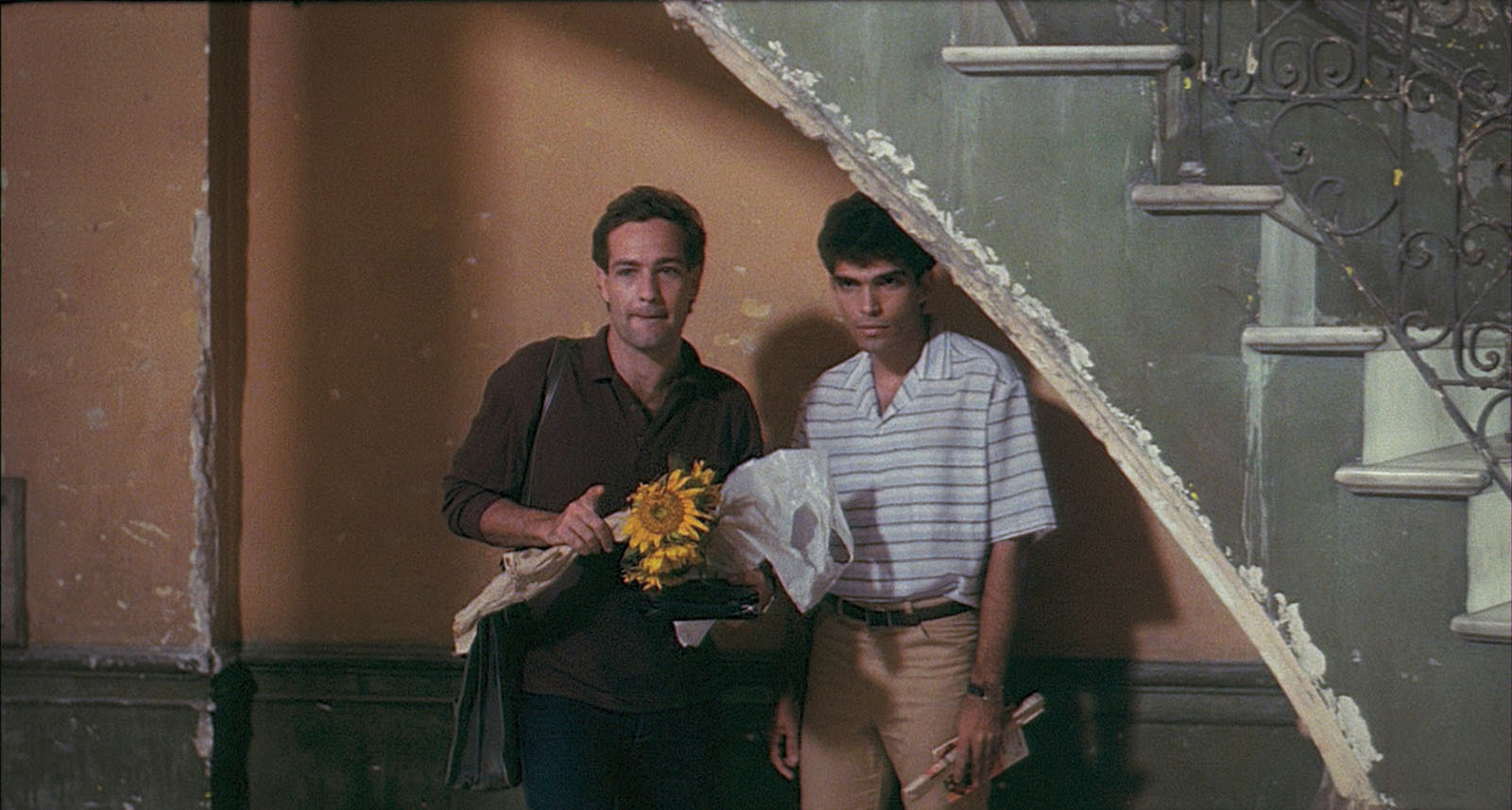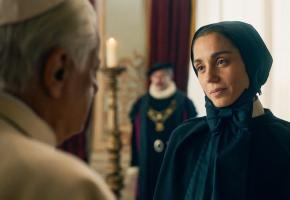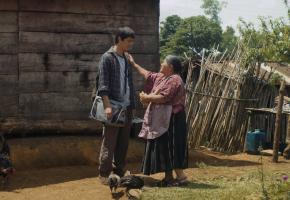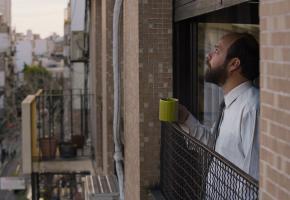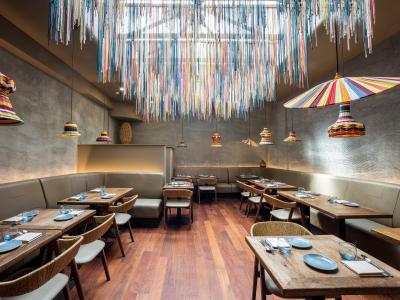Based on a short story, ‘The Wolf, the Forest and the New Man’ ( El Lobo, el Bosque y el Hombre Nuevo) by Senel Paz, Fresa y Chocolate had a huge impact and was awarded the 1994 Silver Bear – Special Jury Prize at the Berlin International Film Festival and went on to pick up a clutch of awards all over the world, culminating in a nomination for Best Foreign Language Film at the Academy Awards.
In 1979 Cuba, flamboyant gay artist Diego (Jorge Perugorría) attempts to seduce the strait-laced David (Vladimir Cruz), an idealistic young communist, and fails dismally. But David conspires to be "friends" with Diego so he can monitor the artist's subversive life for the state. As Diego and David discuss politics, individuality and personal expression in Castro's Cuba, a genuine friendship develops between the two. Can it last in such an oppressive environment?
Non-pretentious and very memorable, seductive is a word constantly used in relation to this ground-breaking 1993 film; seduction of the mind and above all of the emotions. The scenes are permeated with sensuality as Diego enters the screen, making it totally believable that a straight young revolutionary might have been persuaded to go to ‘see some photos’ at the home of an openly gay individual.
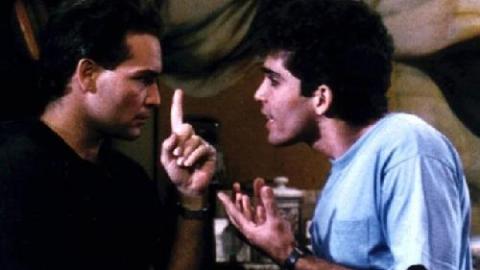
Jorge Perugorría as Diego and Vladimir Cruz as David
There are very long scenes of dialogue with minimal action, normally a killer in film, but the mise- en scene and the emotive energy of the scenes is so subtly handled by the two directors that we are drawn into the ambiguous worlds of revolutionary versus anti-revolutionary and gay versus straight.
When David Alvarez ( convincingly played by Vladimir Cruz) is rejected by his girlfriend Vivian (Marilyn Solaya) who decides to marry an older and richer man, he encounters Diego at the popular Coppelia Ice Cream parlour.
“I knew he was homosexual because although they had chocolate ice cream, he ordered strawberry,”David later relates to his militant revolutionary college mate.
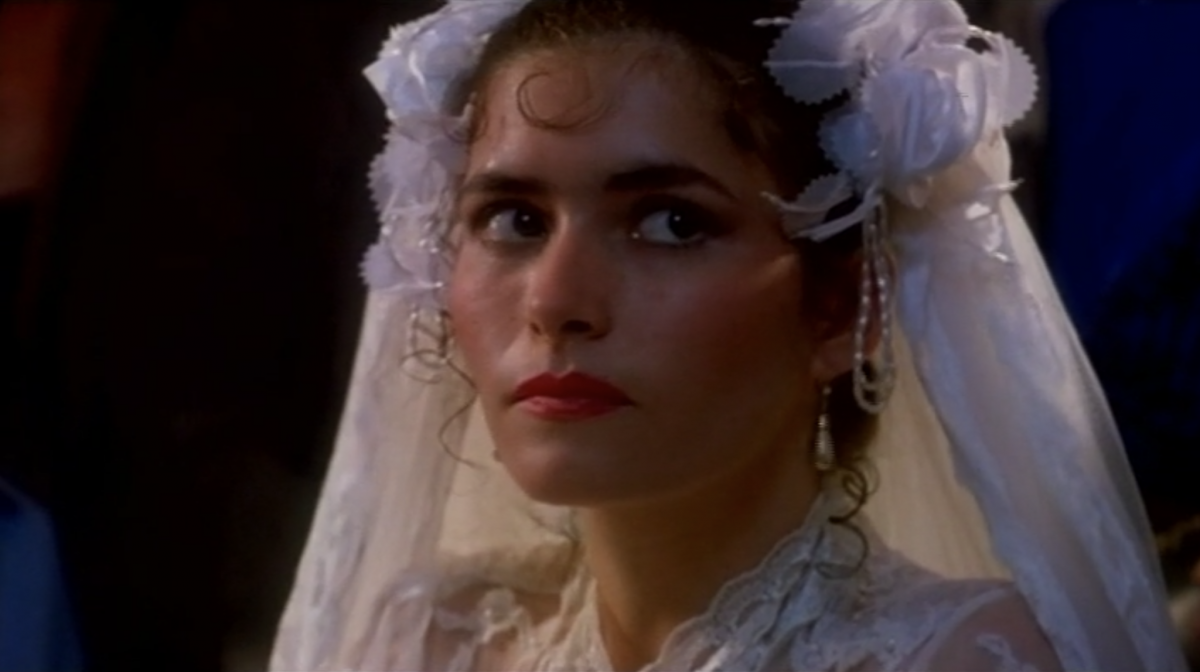 Marilyn Solaya as Vivian
Marilyn Solaya as Vivian
No piece of dialogue is superfluous, here we ascertain that there were problems the provision of consumer items, like ice cream flavours in Cuba at the time. Each character expresses an aspect of Cuban society. Being gay is considered anti-authoritarian, while certain types of art that Diego wishes to exhibit, counter-revolutionary, and so it is that the flamboyant Diego’s collection of literary giants, and music are questioned as suspicious and dangerous.
Diego wants to seduce the Marxist David , but fails. We go into each scene expecting one thing but the outcome surprises us every time. In no time, we find ourselves rooting for Diego, not in his attempts to seduce the handsome budding author, David, but in his desire to live an unencumbered and unrestricted life. He expresses a need desire to feel accepted and to find an outlet for his artistic soul, putting on challenging exhibitions and expressing his thoughts in the increasingly oppressive and ideologically-controlled Cuba of 1979.
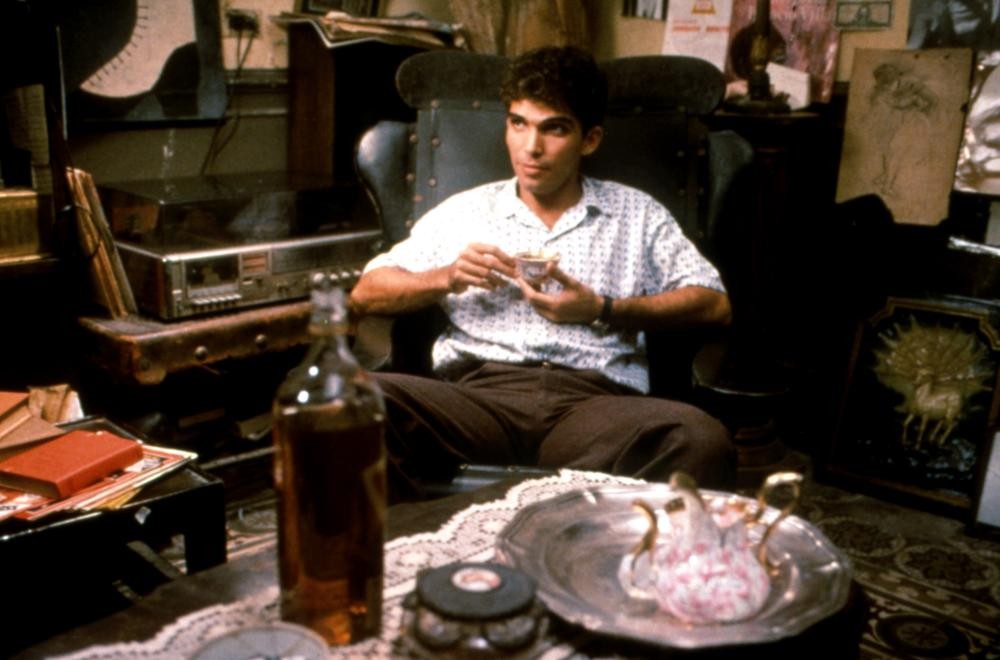 Vladimir Cruz ( David) at Diego's apartment
Vladimir Cruz ( David) at Diego's apartment
Spurred on by his militant and homophobic college friend Miguel (Francisco Gattorno), David befriends Diego in order to spy on him as Diego has revealed an uncanny ability to acquire ‘liberal’ books, including novels by Mario Vargas LLosa, and other ‘subversive’ texts. The rigid Miguel is determined to find a way to denounce him and goads the increasingly reluctant David to gather evidence of Diego’s anti-revolutionary activities. Despite the unlikely match, and the unseemly reasons for the relationship, David and Diego’s friendship develops, changing them both, the intolerant David in particular.
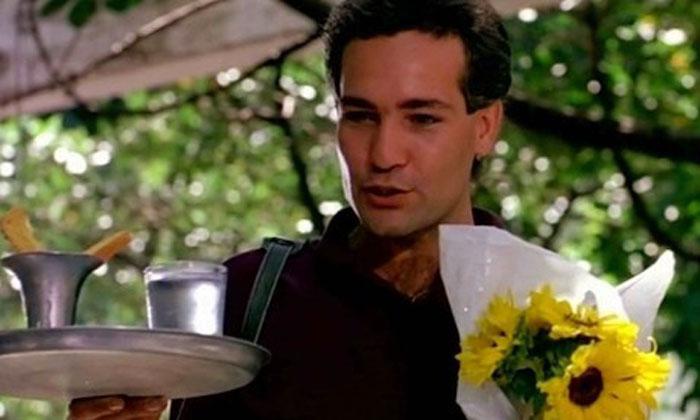 Jorge Perugorría as Diego
Jorge Perugorría as Diego
In this film, everyone is harbouring a sense of guilt and betrayal, including Diego himself, who initially tried to seduce David solely on a bet. The cinematography captures a sense of intimacy that carries the story and the audience along with it. As with the scenes of the virgin David with his first girlfriend, and later his relationship with Nancy (Mirta Ibarra), the building’s ‘vigilante’, everything is subtle and suggested and all the more powerful for it, with fine attention to detail and the idiosyncrasies of the characters. This is a film that manages not to feel at all dated, despite being almost thirty years old. It was shot only three years before Gutiérrez Alea died of cancer in April 1996 at only 67 years of age. In fact, there are two directors on this production because Gutiérrez Alea took ill during the production and needed assistance to complete the film. Having studied film at the Centro Sperimentale de Cinematografia in Rome, Tomás Gutiérrez Alea had returned to Cuba where he became a founding member of the influential “Instituto Cubano de Art e Industria Cinematográfica (ICAIC).
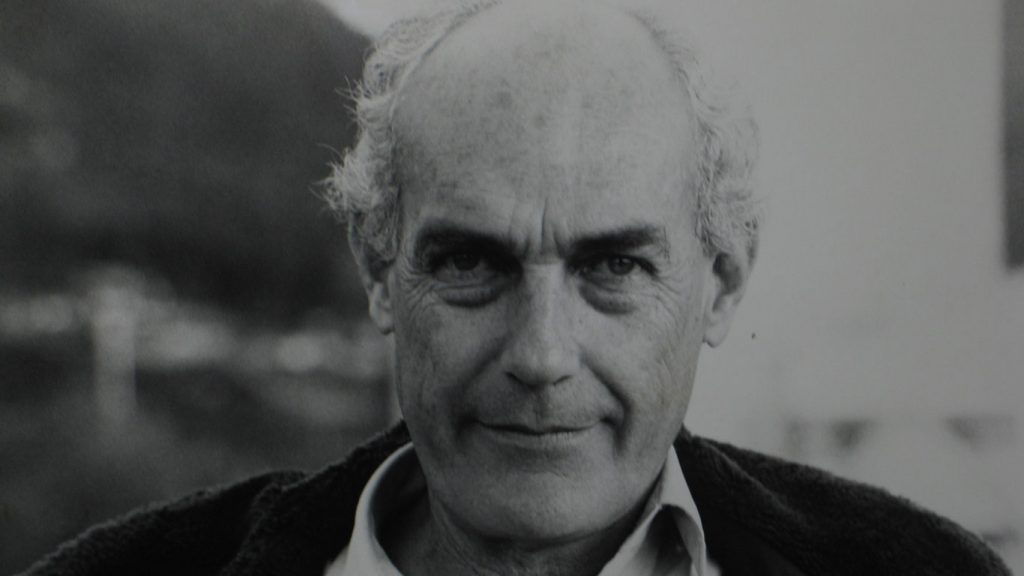 Tomás Gutiérrez Alea
Tomás Gutiérrez Alea
It has been suggested that ‘Strawberry and Chocolate’ is like a companion or continuation of ‘Memories of Underdevelopment’ one of his earlier fiction films. But it falls into a very different mould. ‘Memories of Underdevelopment’ has an underlying angst reminiscent of the sixty’s existentialism, whereas ‘Strawberry & Chocolate’ strides forwards with confidence and gentle humour. Tabio and Gutiérrez Alea both had a keen eye for the intricacies of post-revolutionary Cuba. Their films, both together and individually, opened a series of debates, not flinching too much at criticizing the deterioration of the political, economic and social situation, while still adhering to the ideals of the revolution. Here, in ‘Strawberry & Chocolate’, the viewer is torn between the dichotomies of straight versus homosexual being used like a metaphor, with the ‘seductiveness’ of the liberal viewpoint versus the militancy of an ideal. Which angle will the viewers absorb in the end?
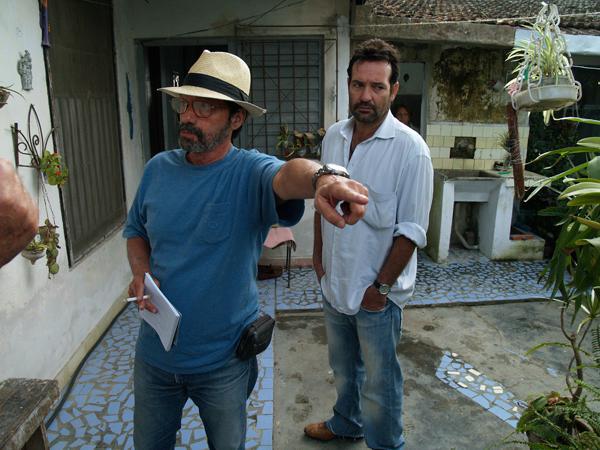
Juan Carlos Tabio with Jorge Perugorría
True to the time in Cuba, where film was seen as a potent tool to educate the masses and spread ideas, these two directors used film to analyse problems that needed to be aired without offering solutions, leaving it up to the audiences to decide how they wanted to think.
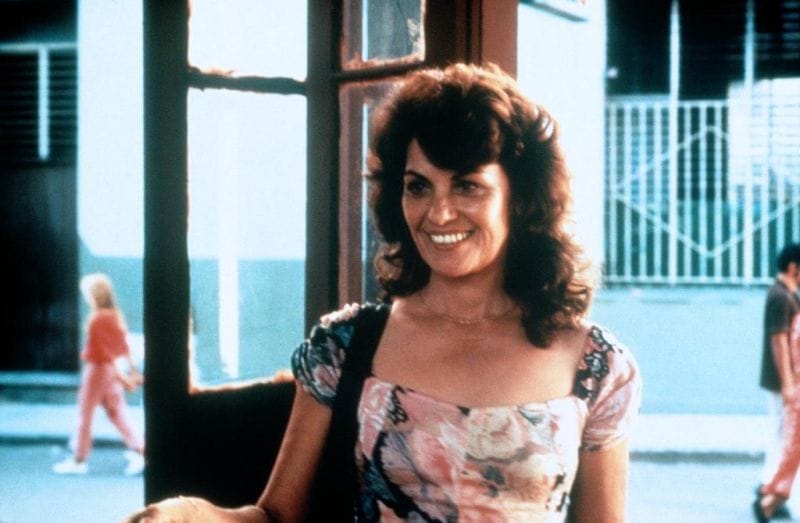 Marta Ibarra as Nancy ( the vigilante)
Marta Ibarra as Nancy ( the vigilante)
The film keeps the audience guessing, romance is present but not as we expect, with the characters themselves representing a critique of the Cuban society of the time. At times it is inevitable to question how the directors could get away with such criticisms? Perhaps because they were able to keep their suggestions ‘open’ without offering definite solutions and as the great critic of the Chicago Sun-Times, Roger Ebert, suggested: It could be considered a form of propaganda “…precisely because it gives the impression that Cubans can safely be critical of Castro”.
Watch entire movie here
Strawberry and Chocolate (1993)
Directors Tomás Gutiérrez Alea and Juan Carlos Tabio
Writer: book and screenplay: Senel Paz
Prod, Georgina Balzaretti/ Frank Cabrera/ Camilo Vives/
Music Jose Maria Vitier
#DOP Mario García Joya
Editing Osvaldo Dontien/ Rolando Martinez/ Miriam Talavera
Cast: Jorge Perugorría, Vladimir Cruz, Mirta Ibarra, Francisco Gattorno, Marilyn Solaya, Joel Angelino


